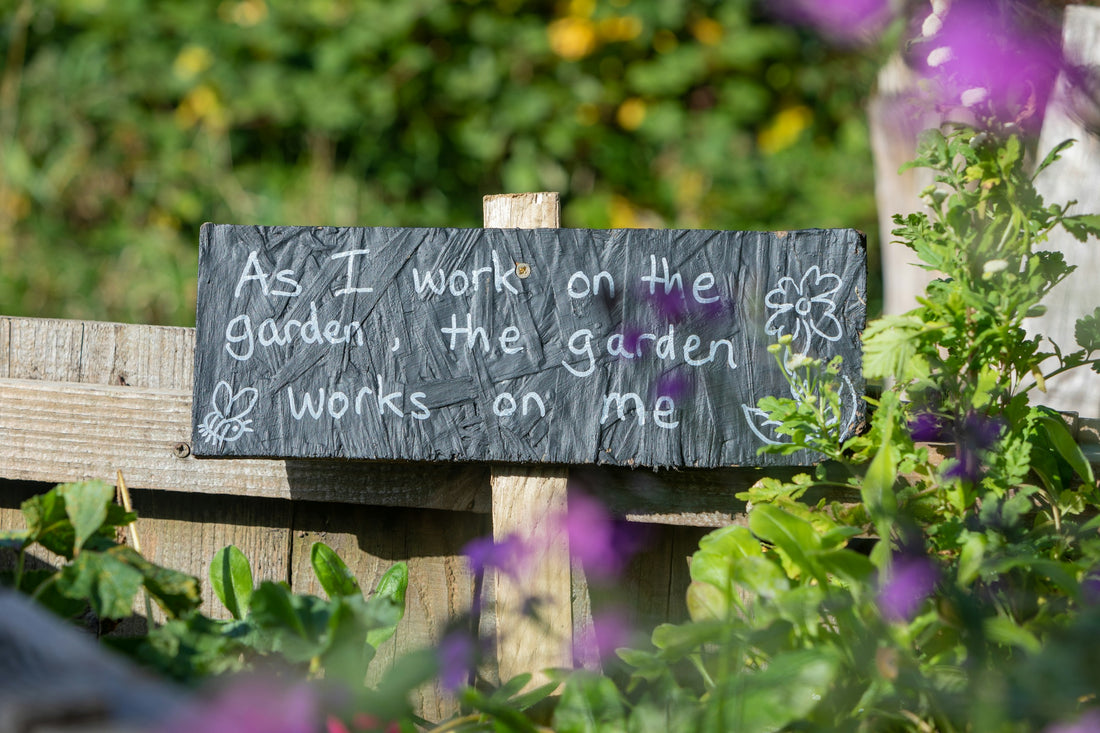
The Power of Planting: Gardening Tips for Stress Relief and Health Benefits
Share
A recent study found that gardening is more popular than ever — a whopping 185 million Americans (more than half of all U.S. households) start gardening each spring, with nearly 19 million people taking up gardening for the very first time in just the past few years. And that shouldn’t come as a surprise. Gardening brings numerous health and wellness benefits, including some surprising benefits for your immune system. This April, dive into the power of planting with our gardening tips that will boost your mood, strengthen your immunity, and help you experience all the benefits of gardening.
Surprising Health and Wellness Benefits of Gardening
 Before we get into our gardening tips for health and wellness, let’s first dig (pun intended) into why gardening is so good for you. Gardening offers a plethora of health and lifestyle benefits, both physical and mental.
Before we get into our gardening tips for health and wellness, let’s first dig (pun intended) into why gardening is so good for you. Gardening offers a plethora of health and lifestyle benefits, both physical and mental.
First and foremost is the exercise component. Who needs a gym when you’re moving your body in healthy, natural ways as you dive into your garden beds and potted plants? Gardening involves various physical activities such as digging, planting, weeding, and watering, which provide a good workout for muscles and joints — thus contributing to improved strength, endurance, and flexibility, plus the immune-boosting benefits of physical activity (researchers say regular exercise doesn’t just power-up your immune system, but can even help prevent cancer!).
In fact, doctors estimate that:
- Heavy yard work burns up to 600 calories an hour
- Raking and bagging leaves torches up to 450 calories/hour
- General gardening, like planting flowers and weeding, burns up to 400 calories/hour
- Cutting grass burns up to 350 calories/hour
Exercise is just the tip of the proverbial iceberg:
- Spending time outdoors exposes you to fresh air and sunlight, which are essential for maintaining overall health. Sunlight helps the body produce vitamin D, which is important for bone health, immunity (learn more about vitamin D and your immune system), and overall well-being.
- Gardening has been shown to reduce stress levels and promote relaxation. That’s because the act of being in nature, focusing on tasks, and observing the growth of plants have a calming effect on the mind.
- Gardening has a positive impact on mental health and mood. Being surrounded by greenery and engaging with nature has been linked to reduced symptoms of anxiety and depression (some people even go as far as to claim “dirt is the new Prozac“), and even boosts your creativity!
- Growing your own fruits, vegetables, and herbs encourages a healthier diet. Freshly harvested produce is often more nutritious than store-bought counterparts, as it retains more vitamins and minerals.
It’s clear that gardening offers a holistic approach to health and well-being, combining physical activity, mental stimulation, and a connection to nature that can enrich and enhance your quality of life. And if you’re new to gardening, don’t worry — our gardening tips will get you exploring the benefits of gardening in no time.
Gardening Tips for Stress Relief and Health Benefits
 Even if you don’t have an acreage or a sprawling farm estate, you can still use these gardening tips for stress relief, a stronger immune system, and more. Researchers have looked closely and found that even indoor gardening and gardening with pots on your patio bring about the same health and wellness benefits!
Even if you don’t have an acreage or a sprawling farm estate, you can still use these gardening tips for stress relief, a stronger immune system, and more. Researchers have looked closely and found that even indoor gardening and gardening with pots on your patio bring about the same health and wellness benefits!
Our gardening tips emphasize specific strategies to get the most wellness benefits out of your new hobby.
But if you’re looking for gardening tips on how to actually get started with gardening, start with these trusted sources from various universities and cooperative extensions (or contact your local cooperative extension for gardening tips specific to your region and local climate):
- Vegetable Gardening For Beginners
- Gardening Tips and Tricks for Beginning Gardeners
- Plant Mama 101: A Beginner’s Guide to Indoor Gardening
Now, let’s get into specific gardening tips that maximize all the wellness and stress-reducing benefits of having your own home garden!
1. Create a Relaxing Space
Designate a specific area in your garden for relaxation, with comfortable seating, soothing elements like a water feature or wind chimes, and plenty of greenery.
2. Practice Mindfulness
Use gardening as an opportunity to practice mindfulness by focusing on the present moment, observing the sights, sounds, and sensations of the garden without judgment. Treat it as a form of moving meditation by focusing on the rhythm of your breath and the repetitive motions of gardening tasks like weeding or watering. Take moments to pause and appreciate the beauty of your surroundings, such as listening to the sounds of birds chirping, feeling the warmth of the sun on your skin, and immersing yourself in the tranquility of nature.
3. Choose Low-Maintenance Plants
 Opt for low-maintenance plants that don’t require excessive care or attention. This reduces stress associated with upkeep and allows you to enjoy the process more.
Opt for low-maintenance plants that don’t require excessive care or attention. This reduces stress associated with upkeep and allows you to enjoy the process more.
And don’t overthink it.
Break up gardening tasks into smaller, manageable chunks to prevent overwhelm and fatigue.
This allows you to enjoy the process without feeling pressured to complete everything at once.
4. Grow Aromatherapy Plants
Incorporate fragrant plants like lavender, chamomile, or jasmine, known for their calming properties, to stimulate the senses and promote relaxation.
Speaking of senses like smell, consider including a variety of plants with different textures, colors, and scents to engage all the senses. Touching fuzzy leaves, smelling fragrant flowers, and listening to rustling leaves enhances the therapeutic benefits of gardening.
5. Harvest and Enjoy Fresh Produce
Incorporate homegrown fruits, vegetables, and herbs into your diet for added nutritional benefits. Harvesting and cooking with your own produce is deeply satisfying and rewarding.
References:
- https://www.prnewswire.com/news-releases/bigger-garden-2023-research-report-shows-that-gardening-is-more-popular-than-ever-301755803.html
- https://www.ncbi.nlm.nih.gov/pmc/articles/PMC6523821/
- https://www.webmd.com/parenting/features/calorie-burners
- https://www.discovermagazine.com/mind/is-dirt-the-new-prozac
- https://pubmed.ncbi.nlm.nih.gov/15535806/
- https://www.ncbi.nlm.nih.gov/pmc/articles/PMC4419447/
